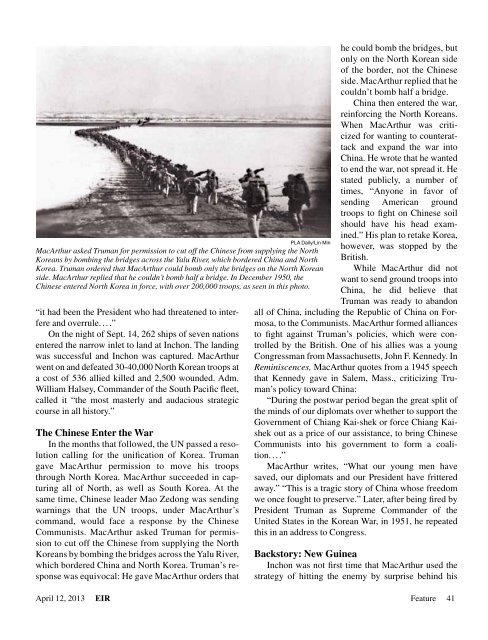MacArthur's Victory at Inchon: Defeating the British Empire by Don ...
MacArthur's Victory at Inchon: Defeating the British Empire by Don ...
MacArthur's Victory at Inchon: Defeating the British Empire by Don ...
Create successful ePaper yourself
Turn your PDF publications into a flip-book with our unique Google optimized e-Paper software.
PLA Daily/Lin Min<br />
MacArthur asked Truman for permission to cut off <strong>the</strong> Chinese from supplying <strong>the</strong> North<br />
Koreans <strong>by</strong> bombing <strong>the</strong> bridges across <strong>the</strong> Yalu River, which bordered China and North<br />
Korea. Truman ordered th<strong>at</strong> MacArthur could bomb only <strong>the</strong> bridges on <strong>the</strong> North Korean<br />
side. MacArthur replied th<strong>at</strong> he couldn’t bomb half a bridge. In December 1950, <strong>the</strong><br />
Chinese entered North Korea in force, with over 200,000 troops, as seen in this photo.<br />
“it had been <strong>the</strong> President who had thre<strong>at</strong>ened to interfere<br />
and overrule. . . .”<br />
On <strong>the</strong> night of Sept. 14, 262 ships of seven n<strong>at</strong>ions<br />
entered <strong>the</strong> narrow inlet to land <strong>at</strong> <strong>Inchon</strong>. The landing<br />
was successful and <strong>Inchon</strong> was captured. MacArthur<br />
went on and defe<strong>at</strong>ed 30-40,000 North Korean troops <strong>at</strong><br />
a cost of 536 allied killed and 2,500 wounded. Adm.<br />
William Halsey, Commander of <strong>the</strong> South Pacific fleet,<br />
called it “<strong>the</strong> most masterly and audacious str<strong>at</strong>egic<br />
course in all history.”<br />
The Chinese Enter <strong>the</strong> War<br />
In <strong>the</strong> months th<strong>at</strong> followed, <strong>the</strong> UN passed a resolution<br />
calling for <strong>the</strong> unific<strong>at</strong>ion of Korea. Truman<br />
gave MacArthur permission to move his troops<br />
through North Korea. MacArthur succeeded in capturing<br />
all of North, as well as South Korea. At <strong>the</strong><br />
same time, Chinese leader Mao Zedong was sending<br />
warnings th<strong>at</strong> <strong>the</strong> UN troops, under MacArthur’s<br />
command, would face a response <strong>by</strong> <strong>the</strong> Chinese<br />
Communists. MacArthur asked Truman for permission<br />
to cut off <strong>the</strong> Chinese from supplying <strong>the</strong> North<br />
Koreans <strong>by</strong> bombing <strong>the</strong> bridges across <strong>the</strong> Yalu River,<br />
which bordered China and North Korea. Truman’s response<br />
was equivocal: He gave MacArthur orders th<strong>at</strong><br />
he could bomb <strong>the</strong> bridges, but<br />
only on <strong>the</strong> North Korean side<br />
of <strong>the</strong> border, not <strong>the</strong> Chinese<br />
side. MacArthur replied th<strong>at</strong> he<br />
couldn’t bomb half a bridge.<br />
China <strong>the</strong>n entered <strong>the</strong> war,<br />
reinforcing <strong>the</strong> North Koreans.<br />
When MacArthur was criticized<br />
for wanting to counter<strong>at</strong>tack<br />
and expand <strong>the</strong> war into<br />
China. He wrote th<strong>at</strong> he wanted<br />
to end <strong>the</strong> war, not spread it. He<br />
st<strong>at</strong>ed publicly, a number of<br />
times, “Anyone in favor of<br />
sending American ground<br />
troops to fight on Chinese soil<br />
should have his head examined.”<br />
His plan to retake Korea,<br />
however, was stopped <strong>by</strong> <strong>the</strong><br />
<strong>British</strong>.<br />
While MacArthur did not<br />
want to send ground troops into<br />
China, he did believe th<strong>at</strong><br />
Truman was ready to abandon<br />
all of China, including <strong>the</strong> Republic of China on Formosa,<br />
to <strong>the</strong> Communists. MacArthur formed alliances<br />
to fight against Truman’s policies, which were controlled<br />
<strong>by</strong> <strong>the</strong> <strong>British</strong>. One of his allies was a young<br />
Congressman from Massachusetts, John F. Kennedy. In<br />
Reminiscences, MacArthur quotes from a 1945 speech<br />
th<strong>at</strong> Kennedy gave in Salem, Mass., criticizing Truman’s<br />
policy toward China:<br />
“During <strong>the</strong> postwar period began <strong>the</strong> gre<strong>at</strong> split of<br />
<strong>the</strong> minds of our diplom<strong>at</strong>s over whe<strong>the</strong>r to support <strong>the</strong><br />
Government of Chiang Kai-shek or force Chiang Kaishek<br />
out as a price of our assistance, to bring Chinese<br />
Communists into his government to form a coalition.<br />
. . .”<br />
MacArthur writes, “Wh<strong>at</strong> our young men have<br />
saved, our diplom<strong>at</strong>s and our President have frittered<br />
away.” “This is a tragic story of China whose freedom<br />
we once fought to preserve.” L<strong>at</strong>er, after being fired <strong>by</strong><br />
President Truman as Supreme Commander of <strong>the</strong><br />
United St<strong>at</strong>es in <strong>the</strong> Korean War, in 1951, he repe<strong>at</strong>ed<br />
this in an address to Congress.<br />
Backstory: New Guinea<br />
<strong>Inchon</strong> was not first time th<strong>at</strong> MacArthur used <strong>the</strong><br />
str<strong>at</strong>egy of hitting <strong>the</strong> enemy <strong>by</strong> surprise behind his<br />
April 12, 2013 EIR Fe<strong>at</strong>ure 41
















